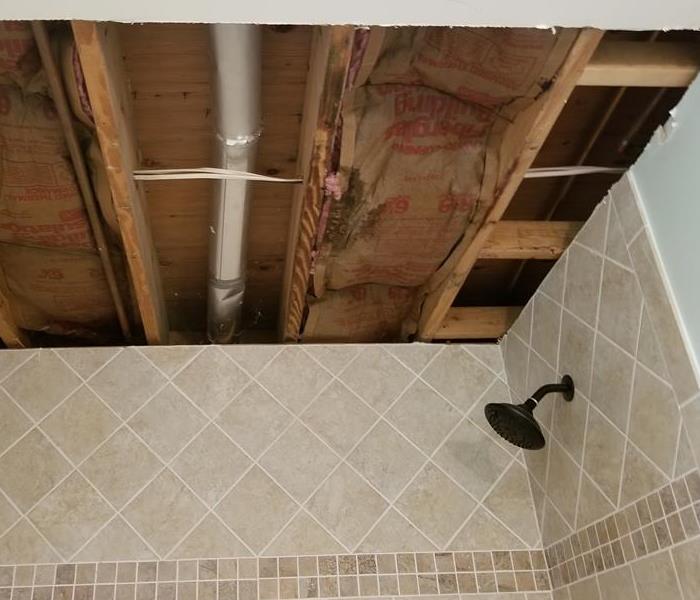Signs of a Shower Leak: How to Detect and Address the Problem
7/13/2023 (Permalink)
A shower leak can cause extensive damage if left undetected and untreated. It not only leads to water wastage but can also result in structural issues, mold growth, and increased utility bills. Identifying a shower leak early on is crucial to prevent further damage and the need for costly repairs. In this blog post, we will discuss common signs that indicate a shower leak, helping you take prompt action and resolve the issue before it escalates.
Damp or Discolored Walls and Floors
One of the primary signs of a shower leak is the presence of dampness or discoloration on the walls and floors surrounding the shower area. If you notice water stains, peeling paint, or bubbling wallpaper, it is likely an indication of water infiltration from a leak.
Excessive moisture from a shower leak creates an ideal environment for mold and mildew growth. If you notice mold or mildew developing on the walls, ceiling, or grout lines in your bathroom, it could be a sign of a hidden shower leak. Pay attention to musty odors as well, as they often accompany mold growth.
Loose or Damaged Tiles
Water seeping through a shower leak can cause tiles to become loose or damaged. If you notice any tiles that are cracked, loose, or coming off the wall, it may be a result of water damage caused by a leak. Inspect the grout lines as well, as deteriorated or missing grout can indicate water penetration.
Spongy or Soft Walls
When water infiltrates the walls due to a shower leak, it can cause the paint to peel, bubble, or become discolored. Keep an eye out for these signs, especially near the shower area or on adjacent walls.
If you press against the walls surrounding the shower and they feel spongy, soft, or give in under pressure, it indicates moisture damage caused by a leak. Moisture weakens the structure of the wall, causing it to lose its rigidity.
Increased Water Bill
A sudden spike in your water bill without any significant changes in water usage patterns can be an indication of a hidden shower leak. Monitor your water bill closely and investigate further if you notice an unexplained increase.
Visible water pooling or puddles on the bathroom floor, even after you have used the shower, suggests a leak. Ensure that there are no other sources of water causing the pooling, such as a dripping faucet or an overflow issue.
Water Stains on the Ceiling or Lower Levels
If your shower is located on an upper floor, water from a shower leak can travel downwards and cause stains on the ceiling or walls of lower levels. Check for water stains or discoloration on the ceiling below the shower area.
What to Do If You Suspect a Shower Leak:
- Inspect the shower area carefully for any visible signs of leaks or damage.
- Check the caulking and grout around the shower, ensuring they are in good condition.
- Test the showerhead, faucets, and valves for any signs of dripping or leakage.
- Consider hiring a professional plumber or contractor specializing in water leak detection to perform a thorough inspection if you are unable to identify the source of the leak.
- Promptly address any identified issues by repairing or replacing damaged components, such as caulking, grout, or shower fixtures.
Detecting a shower leak early on is crucial to prevent further damage and avoid costly repairs. By paying attention to signs such as dampness, discoloration, mold growth, loose tiles, peeling paint, soft walls, increased water bills, water pooling, or stains on lower levels, you can identify a shower leak and take prompt action. It is important to address the issue promptly by repairing or replacing damaged components to mitigate any potential damage and ensure the integrity of your bathroom. Remember, if you're uncertain about the source or extent of the leak, it's best to consult a professional to accurately diagnose and resolve the problem.





 24/7 Emergency Service
24/7 Emergency Service
